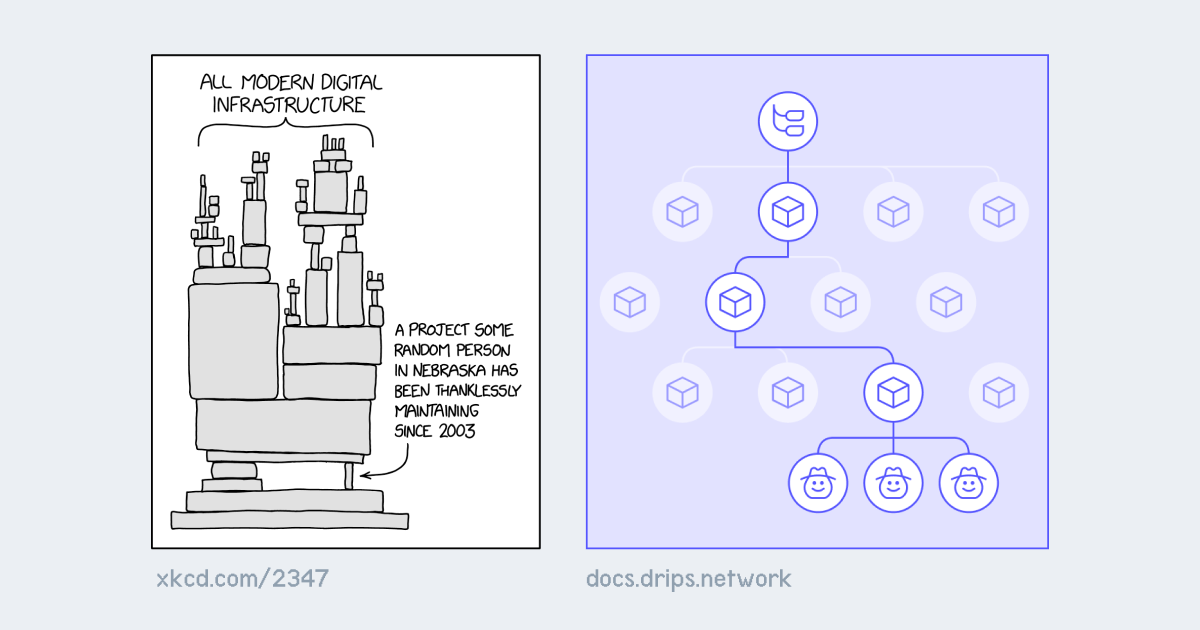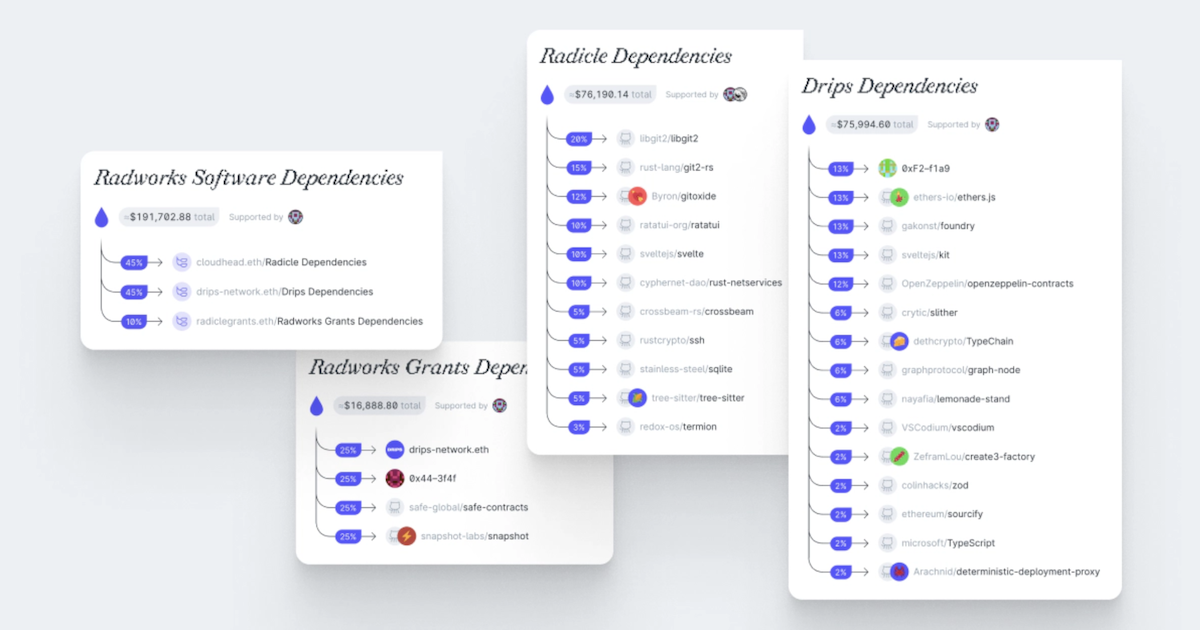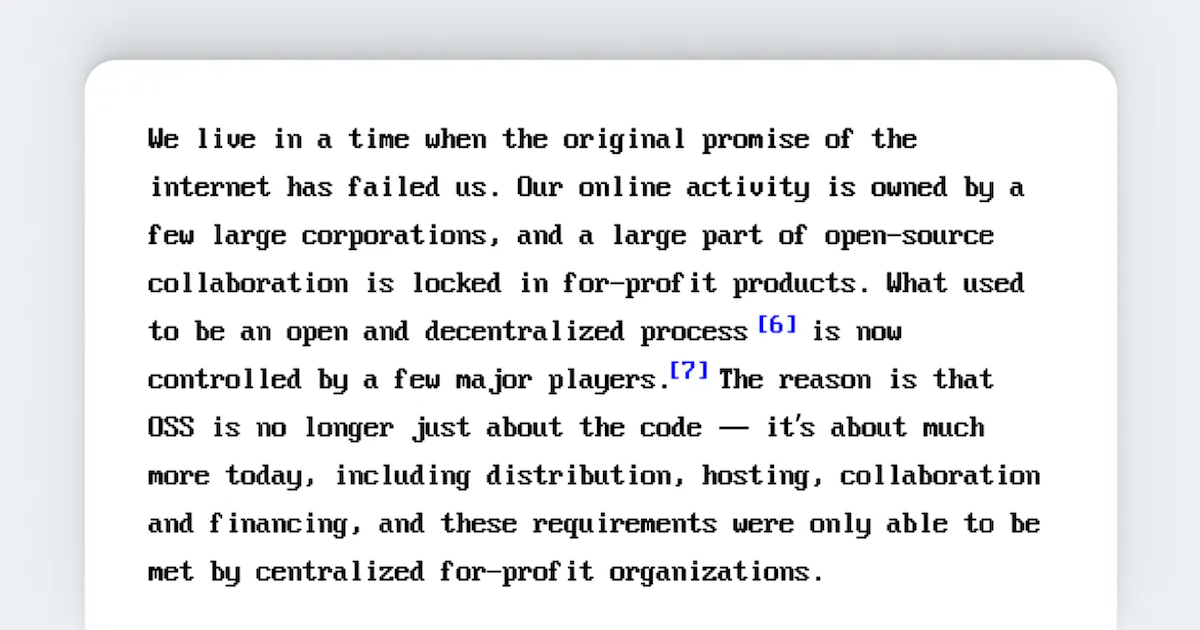We’re thrilled to announce that Radworks is now streaming $1 million to 30 of its critical software dependencies.
This is a watershed moment for Radworks in its journey to build a freer internet. We believe that by actively supporting dependencies, we can enhance the resilience and sustainability of the free and open source ecosystem as a whole.
With this, Radworks becomes the first project to utilize Drips to support open source builders at scale. (That being said, we’ve heard a few whispers that several more are coming soon! 😉)
Radworks is Dripping 💰 to 30 Critical Projects
Supporting critical software dependencies and the digital infrastructure that underpin its ecosystem is a cornerstone of Radworks’ purpose to cultivate a freer internet.
In September 2023, the Radworks community voted to stream $1 million from the treasury over the course of a one year period, half in its native governance token ($RAD) and half via stablecoins ($USDC).
These funds went directly to support Radworks’ dependencies - the critical software packages, tools, and infrastructure that its products are dependent on.

For those less familiar, dependencies are the libraries, frameworks, packages, etc. that all modern software relies on to function. Virtually all developers lean heavily on free & open source components that are created by other people on the Internet. And they’re often maintained by under-funded skeleton crews or builders burning the midnight oil. That is, until Drips.
Radworks set up four Drip Lists - a master list, and 3 nested lists - one for each of its constituent orgs - Radicle, Drips and Grants. They split the $1 million in total funds between those three lists, with 45% going to Radicle’s list, 45% to Drips’ list and 10% to Grants’ list. In total, there are 30 individual software dependencies, of which 15 are from Drips, 11 are Radicle dependencies, and 4 are from Grants.

We’d love to highlight a couple of the amazing projects Radworks is proud to support: ethers.js, Protocol Guild, and libgit2.
Ethers.js and Protocol Guild are Drips dependencies. Ethers.js is a lightweight JavaScript library that enables interaction with the Ethereum blockchain, providing the tools to work with its data in a type-safe, and efficient manner. Protocol Guild is a collective of around 150 contributors who maintain the core infrastructure of Ethereum.
Libgit2 is a Radicle dependency, and is a cross-platform, linkable library implementation of Git anyone can use in their applications.
As you’re able to see if you navigate to ethers.js, Protocol Guild, and Libgit2 in the Drips interface, each of these projects has already received over $10,000 from Radworks via Drips!
Why Radworks Used Drips💧
Drips was created to reimagine the way we fund the communities and builders that we rely on for our mutual success.
And that’s exactly what Radworks was trying to do.
Drips makes dependency funding possible at scale, giving projects a way to support all their critical software dependencies at once, permissionlessly and programmatically. With Drips, you can stream to any GitHub repository you want and they can claim the funds, whenever they want.
As Eleftherios Diakomichalis, Co-Founder of Radicle & Drips describes:
“Drips’ features, such as per-second streaming, flexibility in token choice as well as its flexible identity model where funders can stream to any Git forge URL or Ethereum address, ensures a streamlined and user-friendly experience for both our DAO and the recipients of funding. Unlike other solutions, Drips makes programmatic, recurring funding easy and efficient for both individuals and groups, so it’s multiplayer by design.”
By streaming with Drips, you can help ensure the sustainable development, stability, security and continuous improvement of the critical software we all depend on.
The Bigger Picture: Acknowledging & Supporting Interdependency
Radworks is funding its dependencies to the tune of $1 million because it strongly believes that its individual success is intertwined with that of the broader open source community. If you write code, we’re guessing this rings true for you as well.
As we see it, software developers are hugely dependent on each other — or interdependent — and our own success hinges upon the health of our dependencies, and our dependency’s dependencies, and their dependencies… and so on!
A million years ago (in March 2017) we wrote the oscoin manifesto, where we highlighted a core problem with the internet that, tbh, hasn’t improved much:

It was clear to us then — and it’s very clear to us now — that the mainstream view does not acknowledge the interdependency of all software, and that new structures & new technologies are needed to directly support the communities and open source we rely on for our success.
So we got to work, building. And the result was Drips.
In a world where all modern digital infrastructure depends on thankless maintenance, we all need to fund our dependencies. Maybe, you could be next.
Learn More & Take Action
Explore more details and follow the journey of the initiative through Radworks governance.
- Radworks’ On-chain Vote
- The Governance Proposal and Full Proposal Details
- Set up your own Drip List
- Join the Drips Discord and get in touch
About
Radworks 🌱
Radworks supports a freer internet by empowering builders with the tools & funds they need to thrive. Radworks is run by a decentralized governance system, represented by our $RAD token, and powered by our incredible community of users and builders. In addition to supporting the two product orgs (Radicle & Drips), Radworks engages in community-building activities to build awareness for builders of decentralized & open-source technologies. Follow Radworks on X.
Drips 💧
Drips is an innovative toolkit for automatic, recurring payments that allows individuals to receive payments without intermediaries. Built on cutting-edge decentralized protocols, Drips ensures that payments are transparent and secure. By using Drips, individuals can receive payments on a recurring basis without the need for intermediaries, enabling greater financial autonomy and control. Drip list recipients may be designated using Ethereum addresses, ENS names and Git repositories, may be curated by anyone, and can be public or private. Create your own Drip list.
Radicle 👾
Radicle is a decentralized network for code collaboration that empowers developers to work together without intermediaries. Built on peer-to-peer technology, Radicle ensures transparent and immutable codebases, making them resistant to censorship and tampering. By using Radicle, developers can easily track changes made to codebases while maintaining full control over their data.

